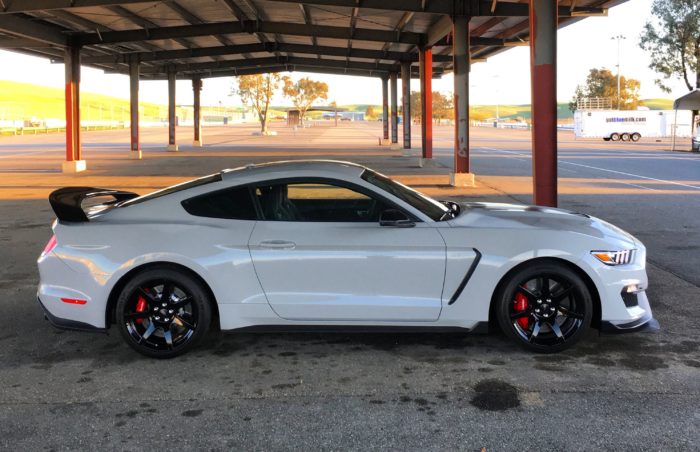The pressure of boost is coming from all angles, as companies at the top like Aston Martin, Porsche, and even Ferrari have succumbed to downsizing and turbos, while almost every other car on the planet uses hybridization or forced induction to stay compliant. It’s only a matter of time before American muscle cars start to see the effects of stricter government regulations on fuel economy and emissions that will forever change the engines we love.
I hate the idea of losing some of my favorite engines, but it’s important to be realistic, and come to terms with the automotive future. No matter how hard we fight, even the American V8 could be forced to breathe with help of a turbo, or the shove of an electric motor. The changing market place will certainly affect the muscle car, but how will Ford, GM, and Dodge respond?
Of all the American car companies nobody has embraced downsizing better than Ford. Their EcoBoost brand and ethos is in every car they sell, they want to push the turbo on the American people more than a millennial wants Instagram likes. Ford has worked so hard to build credibility for EcoBoost. They bet their new Ford GT on the technology and used a turbo V6 in place of a supercharged V8. To show you they are really serious, the new Ford Raptor uses an EcoBoost V6 in place of the massive 6.2L liter V8 from the last generation and most F-150s are turbo V6s. So if you haven’t noticed, Ford is getting you ready for the greatest sacrifice of all, the V8 Mustang.

Now, you may be thinking that is impossible. Ford wouldn’t ditch the very engine that made the Mustang a muscle car in order to keep it complaint in the eyes of the EPA. This does not mean they are safe from the changing market place, even though buying a muscle car is an aspirational purchase based on emotions. Brands that are based on emotional purchases, like Ferrari, have chosen to downsize in order to stay compliant with regulations and provide competitive performance.
In my perfect world, Ford would continue to build incredible V8s like the Coyote found in the GT or the Voodoo from the GT350. But everyone needs to come to terms with reality and it looks like EcoBoost will prevail. That is not to say the next Mustang will use a turbo V6, or Ford will stop building V8 Mustangs, but in the future they will be smaller and use turbos to breathe.
In America, Ford isn’t the only company that is starting to embrace the future of engine technology. Dodge has recently reported a possible turbo V6 to use in upcoming muscle cars that surpasses the power of Hemi engines used across their line up today. Dodge’s lack of foresight has been disturbing these past couple of years. They are one of the only brands that does not sell some sort of hybrid, and their small car sales were so disappointing they decided not to even bother competing. Dodge is now an SUV company that happens to sell the Charger and Challenger, which are brilliant cars. The recent news that they are developing a more efficient turbo V6 to use in their muscles cars caught the world by surprise.
The turbo V6 currently being developed at Dodge is a boosted version of their highly successful Pentastar V6 engine and promises to be useful across the brand. Expect to see this new engine in every Ram, Jeep, and large sedan the brand produces. This engine is clearly a direct response to Ford and their EcoBoost engine offered in their F-150 line. As much as I love the Hemi, an engine like the Pentastar turbo would be great for the brand as its development cost can be diffused throughout the entire brand. As Dodge slowly wades into the world of forced induction, GM may already have a clear layout for the future of their muscle cars.
GM builds some of the finest V8s in the world. The small block Chevy is one of the all time greats and serves the brand well in numerous applications. However, with the recent success of Cadillacs V series and the possibility of a mid-engined Corvette, GM is looking more and more like an engineering company focused on the future. When GM’s first attempt at downsizing could be when they used a twin turbo V6 in the ATS-V instead of a V8. GM also has some experience with electric cars, which may be vital in future applications of hybrid V8s.

GM’s extensive parts bin will most likely aid them in creating a hybrid Corvette or Camaro in the near future to preserve the V8 and use electric motors to elevate performance like in the 918. I would not be surprised if we saw a hybrid Corvette that became America’s P1 in the near future. GM competes directly with BMW and Mercedes with their Cadillac brand, which may accelerate the development of a downsized V8 engine or hybrid performance cars to compete in this engineering heavy segment. GM isn’t killing your favorite OHV V8 engines tomorrow, but change is on the horizon.
We are currently in the golden age of V8 powered muscle cars. Dodge will sell you a 707 horsepower sedan, Ford makes a V8 the revs past 8,000rpm, and GM builds a Camaro that can embarrass a Porsche. These days will always be remembered, and the cars we enjoy now will always live on, at least in our memories. The tide is pulling against us, and it’s only a matter of time before our favorite cars are swept away into the future, forced to adapt or be forgotten.




Leave a reply